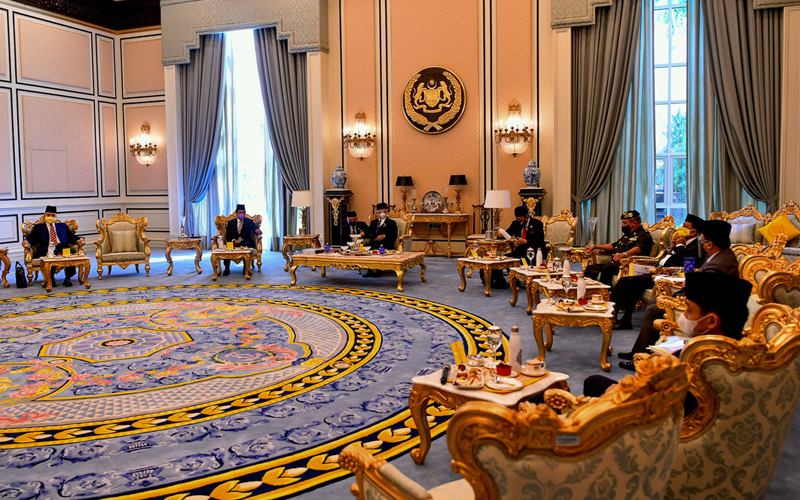
From Hamid Sultan Abu Backer
Whether Malaysia is a secular, Islamic or Malay state is, in principle, an oxymoronic argument within the spirit and intent of the Federal Constitution.
Malaya, in my view, was the land of Muslim Malay rulers. Since the inception of the Federal
Constitution, the Malay rulers have guaranteed non-Muslims freedom of religion as an inalienable constitutional right, provided it is practised in peace and harmony.
In addition, the rulers have preserved the traditional status of Islam as the religion for the Federation itself as set out in Article 3 (1) of the Federal Constitution.
Further, the emphasis for every person to profess and practise his religion and the methodology to do so is set out in Article 11.
The entry of Sabah and Sarawak to form Malaysia did not change the status of both these articles and the supremacy of the Malay rulers to protect the guaranteed rights of all Malaysians, inclusive of the rights and privileges of Malays as well as the people of Sabah and Sarawak.
To ensure the Malay rulers can protect the guaranteed rights of all Malaysians, the founding fathers of the Federal Constitution have given absolute control of the Armed Forces to the Malay rulers, as provided for in Article 41. For this purpose, the Yang di-Pertuan Agong was made the Supreme Commander of the Armed Forces with a Special Advisory Unit referred to as the Armed Forces Council pursuant to Article 137.
This council is not solely represented by the executive, even though their representative has a seat in the council. However, when it comes to the police force and others, the executive is given a greater say under Article 40, where the Yang di-Pertuan Agong must act on advice.
To ensure all constitutional functionaries inclusive of executive, legislature, and judiciary (the three pillars of the constitution), and the Rulers and the Yang di-Pertuan Agong (the fourth pillar of the constitution) can protect the constitutional rights and social justice obligation, the framers of the constitution have provided a constitutional contract by introducing the oath of office for all constitutional functionaries, with necessary variations related to the office.
The oath of office is also a constitutional guarantee to ensure that they act and conduct themselves within the spirit and intent of the constitutional contract.
These important aspects of constitutional jurisprudence have not been captured at all by our legal pundits and/or legal industry; sufficient enough to engage the constitutional functionaries to act as per their oath of office or seek judicial review for breach thereof.
In cases where the executive, legislature or judiciary breached their oath of office, the framers of the constitution have through the oath of office of the rulers given them the power to sustain rule of law in the federation. This power of the rulers is unique and is not even found in the Indian Constitution.
In addition, it is my observation and view that the framers of the constitution had crafted this constitutional provision in a manner to say that the fourth pillar is the supreme pillar of theconstitution – assigning or licensing the administration of the nation and rule of law to the other three pillars of the constitution.
On my part, sitting as a judicial commissioner, judge as well as Court of Appeal judge, I have advocated the above jurisprudence and reasoning in many judgments to jettison out the basic structure jurisprudence advocated by the Indian courts, which does not fit at all in our constitutional framework related to oath of office.
In addition, I have compiled the jurisprudence and published in a booklet, with positive reviews by Malaysian leading constitutional jurists as well as from India and Germany. This booklet, titled “Social Justice: Constitutional Oath, Rule of Law and Judicial Review – Malaysian Chapter”, can be downloaded for free at www.janablegal.com.
As I have stated in many of my articles, the Madani government must take immediate steps to strengthen the legal knowledge of our legal industry itself. A fast-track effort should be made to introduce university cum court annexed arbitration for matters filed in court to reduce court backlogs and also litigation stress.
To ensure rule of law for the benefit of the public, the government must ensure that the legal industry is conversant in all aspects of law and practice.
For the time being, without giving much weightage to oxymoronic arguments and without any form of fear or emotional distress, Malaysians can sleep in peace on the basis that our Malay rulers will protect the constitutional rights and/or privileges of all Malaysians inclusive of internal and external security threat to the nation. - FMT
Hamid Sultan Abu Backer is a retired judge of the Court of Appeal, a professor of arbitration and dispute resolution at MAHSA University, and an FMT reader.
The views expressed are those of the writer and do not necessarily reflect those of MMKtT.



No comments:
Post a Comment
Note: Only a member of this blog may post a comment.